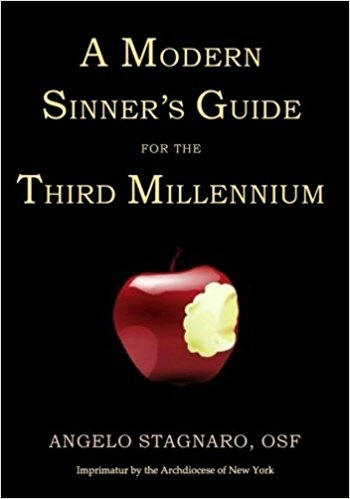Book Review
A Modern Sinner's Guide For The Third Millennium
by Angelo Stagnaro, OSF
Hope & Life Press (28 Sept 2017)
ISBN:
978-0999044711
 What
a wonderful name for a spiritual work and what a good book it is. In
essence, it is an updating of a spiritual classic, The Sinner's Guide, by
the Venerable Louis of Granada, a work which was recommended by many
saints including the great St Francis de Sales. The book by Angelo
Stagnaro is easy to read and understand. It is immensely practical, ideal
for the busy laity and it succeeds in its aim. It gives a description of
sins, especially those that are common to our age and, most importantly
puts forward the remedy against these sins.
What
a wonderful name for a spiritual work and what a good book it is. In
essence, it is an updating of a spiritual classic, The Sinner's Guide, by
the Venerable Louis of Granada, a work which was recommended by many
saints including the great St Francis de Sales. The book by Angelo
Stagnaro is easy to read and understand. It is immensely practical, ideal
for the busy laity and it succeeds in its aim. It gives a description of
sins, especially those that are common to our age and, most importantly
puts forward the remedy against these sins.
Some years ago, a psychiatrist named Karl Menninger wrote a book entitled Whatever Became Of Sin? I have not read it but I understand that the author rightly claims that some psychologists avoid the word "sin". The sinful person is thus in need of therapy as he has a sickness. That may be true for some people but surely not for the majority? Is the sportsman caught using performance enhancing drugs really doing so because of low self-esteem? Is the adulterer really to be admired for his sensuality or pitied for his inability to stay faithful? Is the self-promoting celebrity simply affirming herself? We may even say that there is an actual celebration of sin going on in society and Catholics are not immune from all this. Hence the importance of this book.
The author makes it clear that if we are serious about loving God, we have to follow His commandments. We hear people say: "unlike you Catholics, Jesus would never have condemned the woman caught in adultery." They conveniently forget the "go and sin no more" section of the story. Jesus condemned the Pharisees because they were not serious enough in their condemnation of sin. The real business of the interior life is the cleansing of the soul, not mere external ritual purification.
Throughout the book, we have a clear sense of the objective nature of truth and falsehood. A sin is not a sin simply because I feel it to be so. Indeed if a person continually commits the same sin without struggling against it, any emotional sense of sin will disappear. When we sin badly without attempting to seek a remedy, we move away from God...badly.
But surely if I want to be free, I have a right to choose to sin? No, says the author. We become imprisoned in our sins because sins lead away from truth, which alone leads to authentic freedom.
Once we recognize the seriousness of sin, we are certainly not called to fall into a state of despair. The whole purpose of the religion that Jesus Christ gives us is to fill us with hope. We have prayer and we have the sacraments.
But what about the really difficult problems of life? What about the woman whose husband has left her after many years of marriage? Surely, she is entitled to a second marriage? The author follows the teaching of the Church. However emotionally we feel for the woman, marriage is indissoluble. The trouble is so many of us Catholics are incapable of thinking clearly. Another reason why we need this book. We get caught up in our emotions and end up making absurd claims like in theology two and two may make five sometimes. A Jesuit-run Boston University law professor claims that while Jesus disfavored adultery, nothing in Jesus'words demand that the sin involved must be conceptualized as a sin that continues indefinitely. In other words, if a man commits adultery once, that is bad. But if he does so for several months, that may not be bad. The professor is seeking the merciful solution and in doing so is in danger of turning "mercy" into a dirty word. One also has to love the idea of Jesus disfavoring sin. Do the souls in hell feel disfavored?
What of those who reject the encyclical Humanae Vitae because of over-population? The author rightly says that the Church needs to speak out against these "environmental fundamentalists" and he proceeds to give us good reasons why they need to be condemned.
This book is so helpful that one is loathe to criticize it. I am not a member of the Society of St Pius X, but I have met many of its followers and I have not come across one word of antisemitism from them. It would also have been right to point out that the antisemitic bishop mentioned by the author was expelled from the Society? I also refuse to call them Lefebvrians for the same reason that I refuse to call someone who thinks that every word of Pope Francis is infallible a Bergoglian.
These relatively minor quibbles aside, a really helpful spiritual work, especially for the laity.
Reviewed by Dr Pravin Thevathasan
